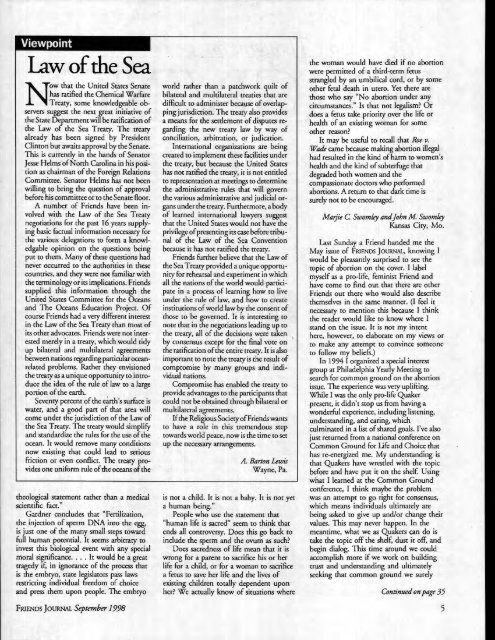Quaker Thought and Today - Friends Journal
Quaker Thought and Today - Friends Journal
Quaker Thought and Today - Friends Journal
You also want an ePaper? Increase the reach of your titles
YUMPU automatically turns print PDFs into web optimized ePapers that Google loves.
Viewpoint<br />
law of the Sea<br />
Now that the United States Senate<br />
has ratified the Chemical Warfare<br />
Treaty, some knowledgeable observers<br />
suggest the next great initiative of<br />
the State Department will be ratification of<br />
the Law of the Sea Treaty. The treaty<br />
already has been signed by President<br />
Clinton but awaits approval by the Senate.<br />
This is currently in the h<strong>and</strong>s of Senator<br />
Jesse Helms of North Carolina in his position<br />
as chairman of the Foreign Relations<br />
Committee. Senator Helms has not been<br />
willing to bring the question of approval<br />
before his committee or to the Senate floor.<br />
A number of <strong>Friends</strong> have been involved<br />
with the Law of the Sea Treaty<br />
negotiations for the past 16 years supplying<br />
basic factual information necessary for<br />
the various delegations to form a knowledgable<br />
opinion on the questions being<br />
put to them. Many of these questions had<br />
never occurred to the authorities in these<br />
countries, <strong>and</strong> they were not familiar with<br />
the terminology or its implications. <strong>Friends</strong><br />
supplied this information through the<br />
United States Committee for the Oceans<br />
<strong>and</strong> The Oceans Education Project. Of<br />
course <strong>Friends</strong> had a very different interest<br />
in the Law of the Sea Treaty than most of<br />
its other advocates. <strong>Friends</strong> were not interested<br />
merely in a treaty, which would tidy<br />
up bilateral <strong>and</strong> multilateral agreements<br />
between nations regarding particular oceanrelated<br />
problems. Rather they envisioned<br />
the treaty as a unique opponunity to introduce<br />
the idea of the rule of law to a large<br />
ponion of the earth.<br />
Seventy percent of the earth's surface is<br />
water, <strong>and</strong> a good pan of that area will<br />
come under the jurisdiction of the Law of<br />
the Sea Treaty. The treaty would simplifY<br />
<strong>and</strong> st<strong>and</strong>ardize the rules for the use of the<br />
ocean. It would remove many conditions<br />
now existing that could lead to serious<br />
friction or even conflict. The treaty provides<br />
one uniform rule of the oceans of the<br />
theological statement rather than a medical<br />
scientific fact."<br />
Gardner concludes that "Fenilization,<br />
the injection of sperm DNA into the egg,<br />
is just one of the many small steps toward<br />
full human potential. It seems arbitrary to<br />
invest this biological event with any special<br />
moral significance .... It would be a great<br />
tragedy if, in ignorance of the process that<br />
is the embryo, state legislators pass laws<br />
restricting individual freedom of choice<br />
<strong>and</strong> press them upon people. The embryo<br />
FRIENDS J OURNAL September 1998<br />
world rather than a patchwork quilt of<br />
bilateral <strong>and</strong> multilateral treaties that are<br />
difficult to administer because of overlapping<br />
jurisdiction. The treaty also provides<br />
a means for the settlement of disputes regarding<br />
the new treaty law by way of<br />
conciliation, arbitration, or judication.<br />
International organizations are being<br />
created to implement these facilities under<br />
the treaty, but because the United States<br />
has not ratified the treaty, it is not entitled<br />
to representation at meetings to determine<br />
the administrative rules that will govern<br />
the various administrative <strong>and</strong> judicial organs<br />
under the treaty. Funhermore, a body<br />
of learned international lawyers suggest<br />
that the United States would not have the<br />
privilege of presenting its case before tribunal<br />
of the Law of the Sea Convention<br />
because it has not ratified the treaty.<br />
<strong>Friends</strong> funher believe that the Law of<br />
the SeaT reaty provided a unique opportunity<br />
for rehearsal <strong>and</strong> experiment in which<br />
all the nations of the world would participate<br />
in a process of learning how to live<br />
under the rule of law, <strong>and</strong> how to create<br />
institutions of world law by the consent of<br />
those to be governed. It is interesting to<br />
note that in the negotiations leading up to<br />
the treaty, all of the decisions were taken<br />
by consensus except for the final vote on<br />
the ratification of the entire treaty. It is also<br />
important to note the treaty is the result of<br />
compromise by many groups <strong>and</strong> individual<br />
nations.<br />
Compromise has enabled the treaty to<br />
provide advantages to the panicipants that<br />
could not be obtained through bilateral or<br />
multilateral agreements.<br />
If the Religious Society ofF riends wants<br />
to have a role in this tremendous step<br />
towards world peace, now is the time to set<br />
up the necessary arrangements.<br />
A. Barton Lewis<br />
Wayne, Pa.<br />
is not a child. It is not a baby. It is not yet<br />
a human being."<br />
People who use the statement that<br />
"human life is sacred" seem to think that<br />
ends all controversy. Does this go back to<br />
include the sperm <strong>and</strong> the ovum as such?<br />
Does sacredness of life mean that it is<br />
wrong for a parent to sacrifice his or her<br />
life for a child, or for a woman to sacrifice<br />
a fetus to save her life <strong>and</strong> the lives of<br />
existing children totally dependent upon<br />
her? We actually know of situations where<br />
the woman would have died if no abortion<br />
were permitted of a third-term fetus<br />
strangled by an umbilical cord, or by some<br />
other fetal death in utero. Yet there are<br />
those who say "No abortion under any<br />
circumstances." Is that not legalism? Or<br />
does a fetus take priority over the life or<br />
health of an existing woman for some<br />
other reason?<br />
It may be useful to recall that Roe v.<br />
Wade came because making abortion illegal<br />
had resulted in the kind of harm to women's<br />
health <strong>and</strong> the kind of subterfuge that<br />
degraded both women <strong>and</strong> the<br />
compassionate doctors who performed<br />
abonions. A return to that dark time is<br />
surely not to be encouraged.<br />
Marjie C Swomley <strong>and</strong> john M Swomley<br />
Kansas City, Mo.<br />
Last Sunday a Friend h<strong>and</strong>ed me the<br />
May issue of FRIENDS JouRNAL, knowing I<br />
would be pleasantly surprised to see the<br />
topic of abortion on the cover. I label<br />
myself as a pro-life, feminist Friend <strong>and</strong><br />
have come to find out that there are other<br />
<strong>Friends</strong> out there who would also describe<br />
themselves in the same manner. (I feel it<br />
necessary to mention this because I think<br />
the reader would like to know where I<br />
st<strong>and</strong> on the issue. It is not my intent<br />
here, however, to elaborate on my views or<br />
to make any attempt to convince someone<br />
to follow my beliefs.)<br />
In 1994 I organized a special interest<br />
group at Philadelphia Yearly Meeting to<br />
search for common ground on the abortion<br />
issue. The experience was very uplifting.<br />
While I was the only pro-life <strong>Quaker</strong><br />
present, it didn't stop us from having a<br />
wonderful experience, including listening,<br />
underst<strong>and</strong>ing, <strong>and</strong> caring, which<br />
culminated in a list of shared goals. I've also<br />
just returned from a national conference on<br />
Common Ground for Life <strong>and</strong> Choice that<br />
has re-energized me. My underst<strong>and</strong>ing is<br />
that <strong>Quaker</strong>s have wrestled with the topic<br />
before <strong>and</strong> have put it on the shelf. Using<br />
what I learned at the Common Ground<br />
conference, I think maybe the problem<br />
was an attempt to go right for consensus,<br />
which means individuals ultimately are<br />
being asked to give up <strong>and</strong>/or change their<br />
values. This may never happen. In the<br />
meantime, what we as <strong>Quaker</strong>s can do is<br />
take the topic off the shelf, dust it off, <strong>and</strong><br />
begin dialog. This time around we could<br />
accomplish more if we work on building<br />
trust <strong>and</strong> underst<strong>and</strong>ing <strong>and</strong> ultimately<br />
seeking that common ground we surely<br />
Continued on page 35<br />
5






